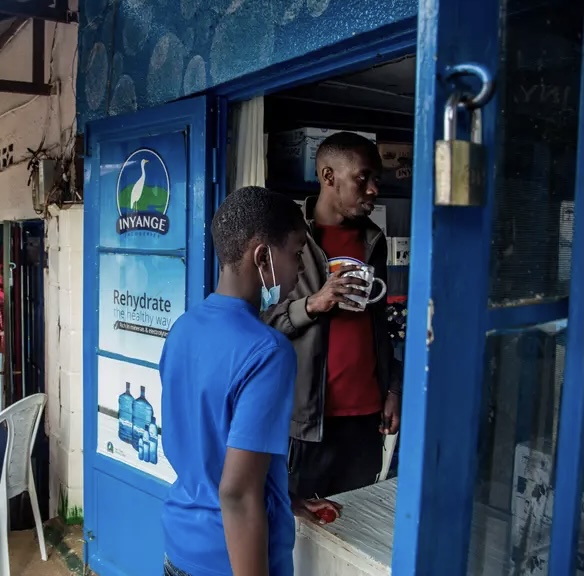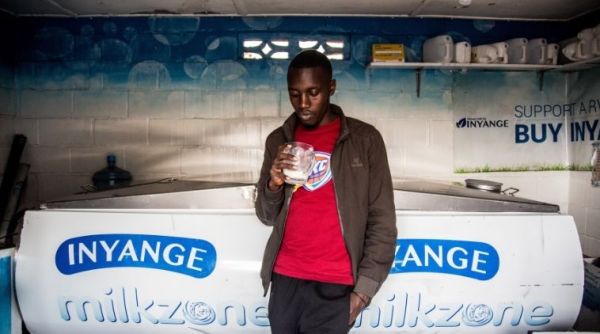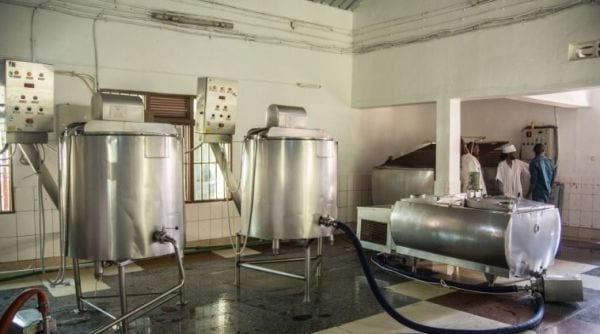News
At Rwanda’s Favorite Bars, Forget the Beer: Milk Is What’s on Tap

Milk is a favorite drink in Rwanda, and milk bars serve it up in abundance, fresh or fermented, hot or cold. “When you drink milk, you always have your head straight and your ideas right.”
New York Times.
As the sun scorched the hilly Rwandan capital on a recent afternoon, a motorcycle taxi driver, two women in matching headscarves and a teenager wearing headphones all separately sauntered into a small roadside kiosk to drink the only thing on tap: milk.
“I love milk,” said Jean Bosco Nshimyemukiza, the motorcycle taxi driver, as he sipped from a large glass of fresh milk that left a residual white line on his upper lip. “Milk makes you calm,” he said, smiling. “It reduces stress. It heals you.”
Nshimyemukiza and the others were all seated at a milk bar, one of the hundreds found everywhere in the capital, Kigali, and scattered all across this small nation of 12 million people in central Africa. In Rwanda, milk is a beloved drink and the milk bars are a favorite place to indulge, combining the pleasures of the beverage with a communal atmosphere.
Men and women, young and old, sit on benches and plastic chairs throughout the day, glass mugs before them, gulping liters upon liters of fresh milk or fermented, yogurt-like milk, locally known as ikivuguto.
 “When you drink milk, you always have your head straight and your ideas right.” (Jacques Nkinzingabo/The New York Times)
“When you drink milk, you always have your head straight and your ideas right.” (Jacques Nkinzingabo/The New York Times)
Some patrons drink it hot, others like it cold. Some — respecting an old custom of finishing your cup at once — chug it down quickly, while others sip it slowly while eating snacks like cakes, chapatis and bananas.
However they take their glass, everyone comes to socialize and unwind. But first and foremost, they drink milk. Lots of it.
“I come here when I want to relax, but also when I want to think about my future,” said Nshimyemukiza, who added that he drinks at least three liters of milk daily. “When you drink milk, you always have your head straight and your ideas right.”
While milk bars have popped up everywhere over the last decade, the drink they sell has long been intrinsic to the country’s culture and history, as well as its modern identity and economy.
Over the centuries, cows were a source of wealth and status — the most valuable gift to confer on a friend or a new family. Even royalty craved easy access to milk. During the Kingdom of Rwanda, which lasted for hundreds of years until the last king was deposed in 1961, cows’ milk was kept in wooden bottles with conical woven lids right behind the king’s thatched palace.
Cows were considered so valuable they ended up in children’s names — Munganyinka (valuable as a cow) or Inyamibwa (beautiful cow) — as well as in traditional dances, where women raised their hands to emulate the giant-horned Ankole cows.
In 1994, Rwanda was the scene of a genocide, during which an estimated 800,000 people were slaughtered within 100 days. The majority of those killed were ethnic Tutsis, historically herdsmen and rich in cattle.
Cattle-keeping families, and their cows, were targeted by extremists from the Hutu ethnic group who were mostly farmers, said Dr. Maurice Mugabowagahunde, a history and anthropology researcher at the Rwanda Cultural Heritage Academy.
As the country recovered from the genocide, Rwanda’s government looked to cows again as a way to expand the economy and fight malnutrition.
In 2006, President Paul Kagame introduced the Girinka program, which aims to give every poor family one cow. The program has so far distributed over 380,000 cows nationwide, according to the Ministry of Agriculture and Animal Resources — with contributions coming from private companies, aid agencies and foreign leaders including Prime Minister Narendra Modi of India.
The program (Girinka means “may you have a cow” in a local language) is one of the development projects that have garnered Kagame support nationwide even as he brooks no dissent and cracks down on rivals.
As milk production increased in this landlocked nation, so did the number of people who moved to urban areas for education and employment. And so were born the milk bars, which allowed farmers to sell their surplus milk and let customers drink copious amounts of it to be reminded of home. Most milk bars are in Kigali, the country’s most-populous city, with 1.2 million people.
Steven Muvunyi grew up with nine siblings in the Rubavu district in the country’s west. After moving to Kigali to attend university, he said he missed being in the countryside, milking cows and drinking milk without limits.
“I come to the milk bars and I am overcome with nostalgia from my childhood,” he said one evening in late September, as he drank from a big mug of hot, fresh milk in downtown Kigali.
As he sat at the bar, Muvunyi, 29, who works in Rwanda’s budding technology sector, showed photos of his 2-year-old son looking at him while he drank a glass of milk at his parents’ farm. He worried, he said, that children growing up in cities would not be as connected to the country’s dairy culture, given the easy access now to pasteurized milk at supermarkets.
“I want to teach my children early the value of milk and cows,” he said.
For all their appeal, the milk bars, and the dairy sector in general, have faced growing challenges in recent years.
The coronavirus pandemic severely affected the industry, particularly as Rwanda instituted one of the most stringent lockdowns in Africa. As authorities mandated a night curfew, closed markets and banned movement between cities and districts, the economy took a hit, and Rwanda slumped into recession.
 Milk processing equipment at Zirakamwa Meza Dairy in Nyanza, Rwanda, Sept. 21, 2021. (Jacques Nkinzingabo/The New York Times)
Milk processing equipment at Zirakamwa Meza Dairy in Nyanza, Rwanda, Sept. 21, 2021. (Jacques Nkinzingabo/The New York Times)
More than half of Rwanda’s small- and medium-size dairy businesses closed during the lockdown, according to the government. Three of the country’s five biggest milk processors were operating from 21% to 46% of their capacity.
The restrictions were particularly hard on small, independent milk bars. In recent years, many smaller bars had closed as corporate chains consolidated their grip on the market.
Climate change has also presented challenges. In recent years, recurring droughts have left thousands of people without food and cows lacking feed and water. Shortages of milk have surfaced nationwide.
Adverse weather conditions over the past four months have also meant a rise in milk prices. On average, a liter of milk at the shops in Kigali has increased from 500 Rwandan francs (50 cents) to 700 francs (70 cents).
For Illuminee Kayitesi, who owns a milk bar in the Nyamirambo neighborhood in Kigali, the lockdowns of the past year affected her ability not only to pay rent, but also to pay her employees and stay profitable enough for her to take care of her family. The recent milk shortages also meant she couldn’t keep the bar’s milk cooler full most days.
While business has slowly picked up as more people get vaccinated and the country reopens, “it’s still not easy,” she said.
But no matter the circumstances, Rwandans say the milk bar is here to stay.
During the pandemic last year, Ngabo Alexis Karegeya started sharing images and videos on Twitter about the Rwandan attachment to cows and milk — drawing national attention. Karegeya graduated from university this year with a degree in business administration, but still fondly remembers his days tending cows as a boy. He tweeted a photo of himself in his graduation gown with the caption “certified cow-boy y’all.”
“Rwandans love cows and they love milk,” said Karegeya, who owns five cows in the lush hills of his family’s home in western Rwanda and drinks three liters a day.
“The milk bar brings us together,” he said. “And we will keep coming to the milk bar to drink more milk.”
Kenya Insights allows guest blogging, if you want to be published on Kenya’s most authoritative and accurate blog, have an expose, news TIPS, story angles, human interest stories, drop us an email on [email protected] or via Telegram
-

 Grapevine1 week ago
Grapevine1 week agoAlleged Male Lover Claims His Life Is in Danger, Leaks Screenshots and Private Videos Linking SportPesa CEO Ronald Karauri
-

 Lifestyle2 weeks ago
Lifestyle2 weeks agoThe General’s Fall: From Barracks To Bankruptcy As Illness Ravages Karangi’s Memory And Empire
-

 Grapevine5 days ago
Grapevine5 days agoRussian Man’s Secret Sex Recordings Ignite Fury as Questions Mount Over Consent and Easy Pick-Ups in Nairobi
-

 Investigations2 weeks ago
Investigations2 weeks agoEpstein Files: Sultan bin Sulayem Bragged on His Closeness to President Uhuru Then His Firm DP World Controversially Won Port Construction in Kenya, Tanzania
-

 Investigations2 days ago
Investigations2 days agoMulti-Million Dollar Fraud: Three Kenyans Face US Extradition in Massive Cybercrime Conspiracy
-

 Investigations2 weeks ago
Investigations2 weeks agoEpstein’s Girlfriend Ghislaine Maxwell Frequently Visited Kenya As Files Reveal Local Secret Links With The Underage Sex Trafficking Ring
-

 News2 weeks ago
News2 weeks agoState Agency Exposes Five Top Names Linked To Poor Building Approvals In Nairobi, Recommends Dismissal After City Hall Probe
-

 Business1 week ago
Business1 week agoM-Gas Pursues Carbon Credit Billions as Koko Networks Wreckage Exposes Market’s Dark Underbelly



























